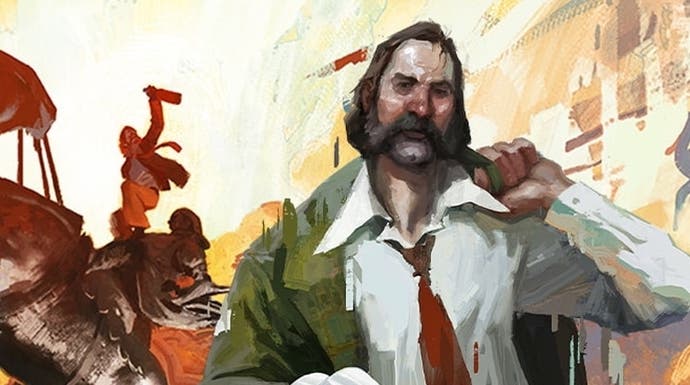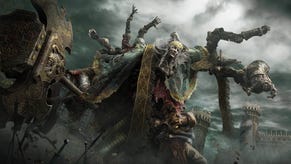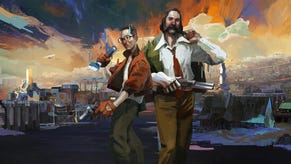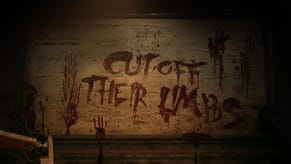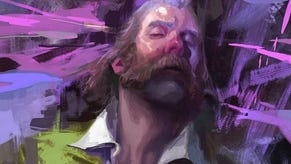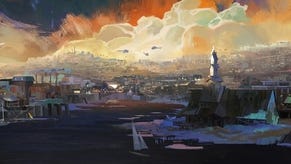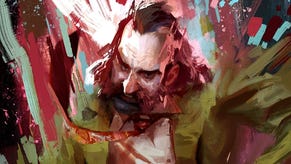Games of the Year 2019: Disco Elysium is about outliving History
You have nothing to lose but your pain.
Over the festive break we'll be running through our top 20 picks of the year's best games, leading up to the reveal of Eurogamer's game of the year on New Year's Eve. You can find all the pieces published to date here - and thanks for joining us throughout the year!
A hard-boiled, wild-eyed cousin of Planescape Torment, Disco Elysium is a game about defeat. Specifically it's about the defeat of the political Left, set on the run-down waterfront of a quasi-European metropolis that once played host to a communist revolution. Revachol was a city built "to resolve History", you're told early on, where "the terrible questions of our time will be answered". Five decades down the line, those answers are writ large in the bullet holes from mass executions, the bigoted orphans roaming the mouldy tenements and the craters left by the neoliberal governments that brought Revachol's revolution to heel.
It's certainly a painful game to contemplate if, say, you recently voted Labour, but Disco Elysium's atmosphere of despair should cling to anybody who has ever sought a better life for themselves, regardless of their politics. Early in the story, you dream of your own corpse dangling from a tree in the scattered light of a disco ball. Through blackened, bubbling lips, the body proceeds to damn you for this world's dreadful plight. "You failed," it croaks, against the melancholy lilt of a distant guitar. "You failed me. You failed Elysium. Four point six billion people - and you failed every single one of them." Coughed up by the past your character is desperately trying to forget, the accusation is ludicrous but horribly convincing: it reflects the demented self-aggrandisements of both severe depression and video games. You aren't just an amnesiac has-been detective, after all, drinking and drugging himself into a not-so-early grave. You're the Player. If any single individual bears responsibility for the state of this universe, it's surely you.
If Disco Elysium makes you feel despair like few other games, it also teaches you to endure that despair like few other games. Mostly, that's because it's so good at giving ideologies of all kinds a tangible reality - not in the form of some academic treatise, though the dialogue is often dense with theory, but in the form of jokes and confessions, cruelty and kindness, architecture and infrastructure. The ravages of that misfiring revolution aren't just a matter for the history books. They echo everywhere in the world, from the coastal shantytowns through the game's never-ending traffic jam to the mind of a man who, in wiping his own memory, has made a hung parliament of his very own skull.
Disco Elysium's masterstroke as both character study and portrait of society is that each of your traits is itself a character. There are 24 in all, from macho sorts like Physical Instrument, through wishy-washy liabilities like Inland Empire (in brief, your sensitivity to paranormal or metaphysical connections), to earnest pedants like Encyclopedia or Rhetoric. No conversation or observation is complete without an outburst from one or more of these personas, and the result is a staggering, if somewhat confounding, piece of writing that allows you to explore every point on the political spectrum, from scientific racism to apocalyptic evangelism. Your ultimate goal is to solve a homicide, aided by perhaps the finest companion character in a game, Lieutenant Kim Kitsuragi. But simply hearing yourself think - whoever you are - is half the battle.
In the course of putting your character's memories back together, you also put together the pieces of Revachol. You develop an affinity for the place - not sympathy, exactly, but an understanding of the forces that built and destroyed it: faith and free markets, technology and superstition, disco-dancers and dice-makers, the will of the proletariat, the divine right of kings and the steady encroachments of the unknowable Pale. You visualise bullet trajectories, Sherlock-style, and weave them into the tapestry. You peer beneath the drained murals and sense the particles of oblivion hanging in the rafters of weather-beaten churches.
This is not a world you can repair - probably, it is beyond repair. But, as Lieutenant Kim suggests, you can at least do it the honour of seeing it clearly and arresting, if only for the instant frozen by a single photograph, the slow implosion of the horizon. "Local law enforcement solving one little homicide decides nothing," he tells you, as you look from a motel balcony at the end of your first day in the game. "Not solving it... can have real and calculable effects. Things can always get worse."
